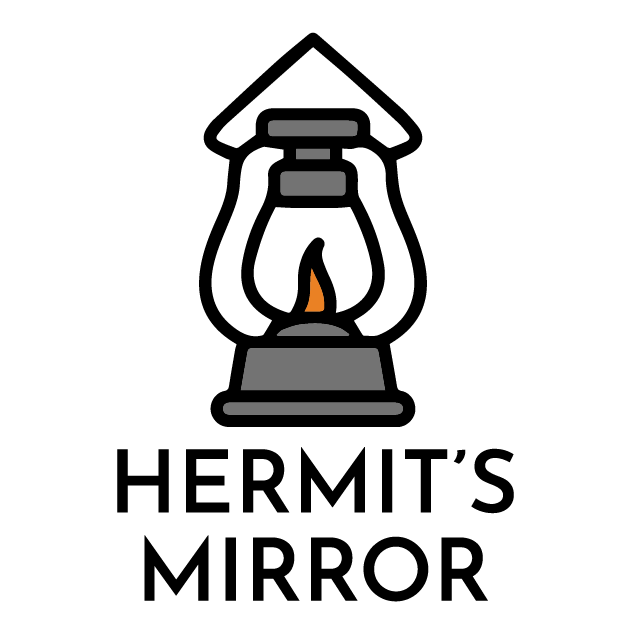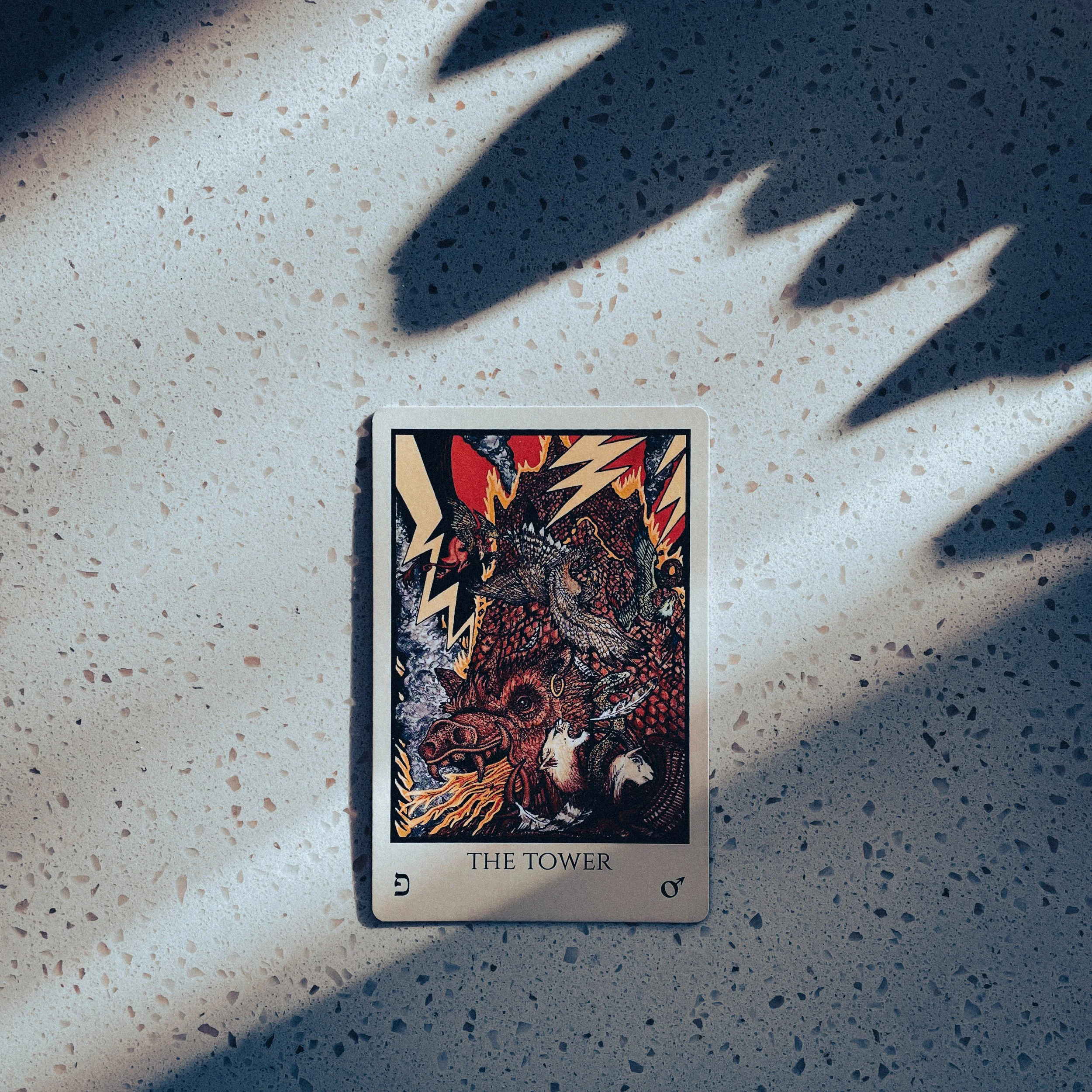Fear and Tarot, Part 1
Fear can feel overwhelming and make it impossible to see clearly. The Tower from the Tabula Mundi Tarot by M. M. Meleen is made up of terrifying creatures in a storm of fire and lightning.
For all the shadow work I do and help others do for themselves, I don’t talk much about fear. As a middle-class, Euro-American cisgender man who’s almost six feet tall and can lift more than his bodyweight overhead, I sometimes don’t feel as if I experience or should experience fear as often as many others. But fear and what surrounds it have been coming up a lot for me recently, and not just because it’s October, so it seems like the time is right.
But perspective can often show us that reality is not as frightening as our limited frame of reference has made it out to be. I didn’t change anything to this card set-up except for the angle of the shot and the filter used.
I actually debated not writing this, but I asked my Tabula Mundi Tarot what I should write about if not fear, and then I drew the Tower. Fear it is. That said, it’s a complicated topic for me, so I will be parsing my thoughts out over a series of smaller blog posts. That way I can respond to things after they’ve settled without feeling like I have to have covered all angles. As it is, I’ve had a draft of this post open on my computer for two weeks now, and I think I’ve been overthinking it. So let’s start with the most important part of this series and see what else, if anything, really needs to be said.
Coming to Tarot in Fear
People often come to tarot in a state of fear, and it makes sense: tarot helps us answers questions. And when do most people have questions? When they are uncertain. And what regularly accompanies uncertainty? Fear.
But seeking answers through fear, rather than, say, curiosity or planning or self-improvement, is probably the worst time to try to understand what tarot can tell you. If you’re reading for yourself, your intuition and subconscious are trying to be heard above your survival instincts, but that’s a recipe for failure. By design, your survival instincts should be drowning everything else out. That’s part of how they help you survive. Your survival instincts and fear are very useful in that they are good at what they’re supposed to do. But they’re bad news for higher functioning.
And if you’re coming to someone else for a tarot reading in a state of fear, it may be hard to actually understand what they’re trying to help you understand. If you are scared of losing your job, and your tarot reader tries to explain how the Death card in their particular layout represents the natural ending of cycles and slowdown of growth at your company, you may misinterpret that as preparations for layoffs because you are already scared of layoffs. Many experienced querents can set their mind appropriately before a reading, but it’s hard to let those extraneous thoughts stay out of your mental space. And many talented tarot readers can set a querent’s mind at rest before a reading. But many a tarot reader will also tap into the querent’s energy, so unless that fear is fully out of the psychic space of the reading, they may pick up those fears without realizing where they’re coming from.
So when you are unsure of what to do, and you want to reach for your cards, take a moment to pause and ask yourself whether it will be a useful exercise. Yes, you will pull cards, and you will probably derive meaning from them. But will it be the right meaning? The cards don’t speak on their own; they speak through your connection to them, psychologically, intuitively, spiritually, or magically. So whenever you are in an agitated or limited state, such as when you have fear-blinders on, you need to ask yourself, “Will I be especially limited by this current frame of reference?” (We’re always limited in some ways, so I added “especially” for those of you who are literalists.)
If, as is often the case, we will be especially limited by that fearful frame of reference, we should not waste our time with trying to read tarot because the reading will probably be unclear or, worse, we will read into it what we already fear. What’s the point? Instead, we should focus on what we can do in the moment to remove the source (or at least the symptoms) of the fear. You may not be able to remove your fears fully, but you will find a stable point in which you no longer have to act out of fear. You will be able to think more deeply and with control, not spinning or jumping rapidly or, conversely, paralyzed. That’s the time for the tarot reading. It may sound obvious, but it’s a good reminder because tarot’s knack for helping us problem-solve can be feel appropriate.
Coming to Tarot in Desperation
When you read “fear,” you may be picturing a dramatic scene of wide eyes or tears or panicked head-swiveling, but the kind of fear that inhibits good tarot reading doesn’t have to look so cartoonish. Desperation stems from fear, and desperation is an equally bad environment for a tarot reading. It may actually be worse than fear because it seems such a reasonable time to turn to outside help. After all, when you are desperate, you need to resolve your situation, and you need help. Why wouldn’t you turn to tarot?
Desperation is usually tied to fear, but it often has an additional fatal characteristic when it comes to tarot readings, and that’s the surrender of one’s agency.
When I first started reading tarot for strangers, I would receive a lot of requests about love readings related to exes. This is not unusual for tarot readers, and I’ve often joked with other tarot readers about the typical reading request that involves someone wanting desperately to get back with their ex and wondering when they will call or text. There are subtle fears underlying requests like these, from the fear of never finding love or feeling loved to the fear of never feeling desirable or the fears around facing financial uncertainty or uncertain living arrangements. It is easy to characterize people in these situations as somehow silly or less deserving of serious attention, especially when their fears fall into the category of hyperbole (e.g., never being loved) rather than immediate problems (e.g., uncertain living arrangements), but it’s not fair to doubt those fears. Those fears are valid, and, as fears, they are held tightly beyond reason because reason has been overridden by survival needs. That the querent has these fears is not inherently bad or wrong, but these fears do undermine the utility of a tarot reading.
What makes tarot so tempting when you are desperate is that tarot and tarot readers offer a specific kind of future certainty, and when the future is less uncertain, it is less frightening. That’s not bad. That’s part of the point of readings. But many querents who are looking for a fortune teller—tarot readers or others—can come away from a reading with an impression that the future is fixed and that destiny has been prewritten. Their part is done or a foregone conclusion. And that is more likely to disempower than empower the querent. When the future is laid out before you, it is easy to relinquish control and agency and just let things happen. Now, you may believe that you need to trust more in the divine and release control over events, but that doesn’t mean forsaking your agency. If you accept the outcome of a reading as a fait accompli, you have released your power to weave your own fate. And in many cases, you’ve probably relinquished your decision-making responsibilities. And when you do that, you’re prone to accepting bad options.
I don’t think I can count the number of times that I’ve had to explain that “your ex coming back” is not the same thing as “you having a healthy, long-term romantic relationship with your ex.” It’s an important distinction, don’t you think? The assumptions built into that slippage, from “coming back” to something more permanent and meaningful, are actually a good starting point for coming to the tarot in the right headspace. When you are seeking the tarot’s advice in a time of desperation, take the time to determine what it is that you want, from the bare minimum and what you expect that to provide to your desired end goal. Often, we use tarot as a decision-making tool when desperate, but we actually usually know what it is that we want. We just have to get into the right mindset to think about it and express it. Don’t underestimate the power in understanding and expressing that.
As with more obvious fears, our perspective is limited in desperation, but taking a few moments to understand what we really want to know or see realized can go a long way in helping maintain agency and self-sovereignty. Even when you release control to higher powers, self-sovereignty remains. You are still in control of your life and choices, whatever else comes your way for good or ill.
Understanding what we want helps us work toward that future. It also helps us understand what tarot has to say about the likelihood of that future, as well as its likely obstacles and points of easy progression. All of that is useful information that helps clarify and add certainty without our giving up agency or remaining in a limited framework of understanding thanks to fear. From that place of thought and empowerment, we are so much more likely to actually achieve what we want, and because of that, our fears and desperation will have much less of a hold on us the next time.
The Devil, the Tower, and the Star
I’ll probably be talking about the “scary” cards in the tarot at some later point, but I think it’s good to remember that the Star comes after the Devil and the Star. The Star is not only a card of hope but also a card of mental clarity and future-thinking. The Star provides hope through its ability to look beyond this present moment. Its healing takes some time and is not immediate. And I encourage you to meditate on the Star whenever you feel the need to read tarot during a time of desperation or a time of fear. When it provides you with mental clarity and the ability to think in logical as well as dreamy future terms, then you are ready to engage in a tarot reading. Until then, let the Star’s clarifying and healing waters wash over you.


